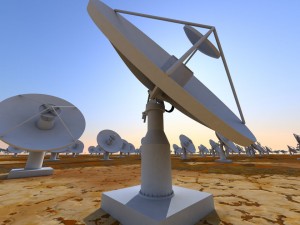It’ll be one of the biggest scientific projects since the Large Hadron Collider was constructed beneath the Franco-Swiss border and could massively advance what we know about the universe and how it was formed.
 And a global competition to host the Square Kilometre Array project also means New Zealand may get to play a significant role in its development and ongoing operation. A shortlist of candidates to host the SKA has been chosen and it is a short list indeed – Australia and South Africa are fighting it out to build this array of radio telescopes on their home turf.
And a global competition to host the Square Kilometre Array project also means New Zealand may get to play a significant role in its development and ongoing operation. A shortlist of candidates to host the SKA has been chosen and it is a short list indeed – Australia and South Africa are fighting it out to build this array of radio telescopes on their home turf.
In a fascinating lecture given last night at Victoria University by Dr Brian Boyle, Director of the CSIRO Australia Telescope National Facility outlined what the project, which aims to assemble a telescope with 10,000 times the sensitivity of the most powerful existing radio telescope, could mean for Australia and New Zealand. The lecture is to be broadcast by Radio New Zealand (no confirmed time yet).
Dr Boyle spent some time outlining the numerous ways in which the SKA could accelerate progress in the field of astronomy, not least of which are aiding in the search for other planets and even artificial intelligence.
Victoria University radio astronomer Dr Melanie Johnston-Hollitt is one of only a tiny handful of scientists in the country working in the field and hopes Australia’s pursuit of the project could provide a major boost for radio astronomy in New Zealand.
“To date, there has been little radio astronomy research conducted in New Zealand, and I think this is a great opportunity to change that. After talks with Australian Prime Minister Kevin Rudd in March, our Prime Minister indicated that New Zealand would collaborate closely with Australia in the bid to host the telescope,” he said in a statement.
The SKA project is immense in size. Construction will cost 1.5 billion euros, with running costs per year about 10 per cent of the construction cost. With the SKA to be constructed for a 50 year life span that means hefty ongoing costs that will need contributions from governments and the research community on a global scale.
The amount of bandwidth required by the SKA is staggering, so serious improvements in broadband infrastructure and computer processing power will be needed to co-ordinate it. The telescope array will also require a constant power source. Dr Boyle said the Australians plan to harness solar thermal energy to help power the SKA.
So where does New Zealand fit into the Australian plan? Well, there are plans to erect some radio telescopes as part of the project here, to give the instrument more reach overall. But when asked what New Zealand could contribute to the running of the SKA, Dr Boyle pointed to our strengths in ICT (for distributing the masses of data received by the SKA and in the area of geographic information systems – an area in which New Zealand is world-leading.
A decision on who will host the SKA will be made in 2012. What could tip the balance in Australia’s favour?
According to Dr Boyle a couple of things give Australia the edge:
– Australia’s sparsely populated interior, which is well suited to locating spread out clusters of radio telescopes and means that population growth isn’t likely to lead to radio interference with the SKA equipment in the next few decades.
– Australia’s current strength as a centre of excellence in the world in the area of radio astronomy. This goes right back to the 1950s and the construction of the Parkes Observatory and its 64 metre radio telescope. There are an estimated 150 radio astronomers in Australia and the country is highly regarded as one of four international hot-spots for research activity in the field.
He didn’t mention that with billions invested in the SKA, scientific bodies may be nervous about their valuable scientific tool being spread across several African nations in a volatile geopolitical area.
But he admitted that the deciding factors are likely to be money and politics and pointed out that there may be an argument for placing the SKA in Africa to help speed infrastructure development in the southern part of the continent.
Dr Boyle, scientists and government officials were today meeting to discuss how to co-ordinate the joint Australian-New Zealand pitch for the SKA project. It is good to see the level of activity on SKA starting to increase given the fantastic spin-offs for science and New Zealand in general the project is likely to have.